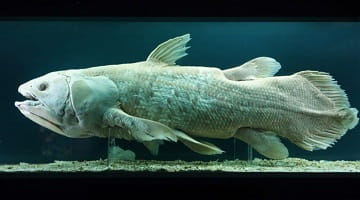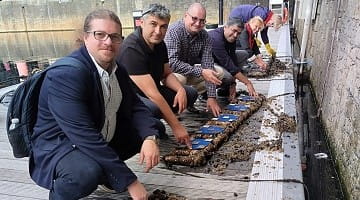About this course
Learn about the latest developments in primate behaviour, conservation and welfare on this programme delivered by world-leading experts.
- Develop your skills to become a professional primatologist and support a range of in-situ and ex-situ conservation efforts
- Features an overseas field course*, providing hands-on learning in measuring primate behaviour and ecology. This enables you to practise and develop advanced skills in behavioural observation, non-invasive sampling of health and welfare indicators and conservation monitoring
- Access state-of-the-art teaching and laboratory facilities, including genetics, endocrinology, drone and GIS facilities
- Design and complete a primate field study using the latest software packages, such as R, CyberTracker and QGIS
- Work with our partners in industry and field sites in Asia, Africa, Central America, Europe and the UK, as well as zoos, sanctuaries and NGOs globally. These connections will give you the opportunity to develop and extend your professional networks
On this MSc programme you will be supported by a thriving primatology group with a broad mix of expertise in behavioural ecology, social behaviour, cognition, welfare and conservation. You will have the chance to engage in innovative research on primate behaviour and welfare and to effect positive conservation change. As part of your studies you will be encouraged to attend and present your work at national and international conferences, and to publish your research in scientific journals.
Course modules
Discover the building blocks of your programme
The academic staff leading this course conduct research in this area. Your programme leaders uphold a wide range of international and national connections that can provide exciting opportunities for you during and after the course. You will have the opportunity to conduct fieldwork at international sites and make career-long connections.
Further guidance on modules
Modules are designated core or optional in accordance with professional body requirements, as applicable, and LJMU’s Academic Framework Regulations. Whilst you are required to study core modules, optional modules provide you with an element of choice. Their availability may vary and will be subject to meeting minimum student numbers.
Where changes to modules are necessary these will be communicated as appropriate.
Core modules
Dissertation
60 credits
60 credits
The aim of this module is to enable you to conduct independent scientific research under the guidance of an academic tutor. It gives you the opportunity to make a major contribution in a chosen subject area through a supervised programme of individual study. It also allows you to demonstrate your ability to carry out scientific research and to present findings as a scientific report.
Applied Research Methods
20 credits
20 credits
This module provides extensive training in generic research knowledge and statistical techniques for the Natural Sciences. It aims to provide you with a broad appreciation and application of research methods and methodology, including an understanding of the uses and limitations of different research methods. You will also learn how to design and execute a wildlife conservation project keeping in mind feasibility, ethics, data protection, and project logistics and funding.
Primate Behaviour Conservation and Welfare
40 credits
40 credits
This module provides a foundation in the key theoretical concepts in the field of primatology within an evolutionary framework. You will develop your ability to critically evaluate material from different scientific sources, and formulate new ideas, supported by a team of primatologists at the forefront of the discipline. You will learn through in-person lectures, workshops, one day field courses in the UK, journal-club discussion and debate, seminars, tutorials and 1-2-1 meetings with staff. Assessment is through a written essay and a seminar presentation portfolio that you build up across the semester.
Contemporary Methods in Primatology
20 credits
20 credits
The modern study of primates requires a diverse range of laboratory and technical skills. Through this module you will gain valuable hands-on experience in scientific techniques that are highly transferable, under the guidance of experts in each technology. You will learn through in-person lectures, field trips and practicals in our state-of-the-art facilities. Assessment is through practical tasks and a research report portfolio that you build up across the semester.
Field Skills for Primatologists
40 credits
40 credits
This module provides training in key practical field skills and latest advances for all primatologists. You will learn observational, technological and ecological assessment methods that are transferable to other research and professional contexts. You will be taught by world-leading, research-active primatologists through in-person lectures, workshops, seminars and a residential primatology field course. Assessment is through a poster presentation, practical task and a research report.
Your Learning Experience
An insight into teaching on your course
This Masters focuses on practice-based learning through: lectures, seminars, workshops, student-led discussion groups, laboratory and fieldwork. You will design and complete a primate field study using the latest software packages, such as ArcGIS, R, Distance and CyberTracker. Self-guided study is a key requirement at MSc level, so you will have the flexibility to organise your study time outside of contact hours.
How learning is monitored on your programme
To cater for the wide-ranging content of our courses and the varied learning preferences of our students, we offer a range of assessment methods on each programme.
Where you will study
What you can expect from your School
This programme is based in the City Campus. Here you will find world-class teaching and laboratory facilities (including state-of-the-art genetics, endocrinology, drone and GIS facilities), which you will be able to use during the course. You will also have 24 hour computer access and access to specialist software. In addition, the LJMU library has an extensive collection of online and hard copy book, journal and internet resources related to studying primate behaviour, conservation and welfare.
Course tutors

Dr Emily Bethell
- Programme Leader
It is a real privilege to help train the next generation of primatologists. Teaching students on the latest developments in the field is a great way to involve students with my own programme of research.
It is a real privilege to help train the next generation of primatologists. Teaching students on the latest developments in the field is a great way to involve students with my own programme of research.
Dr Bethell gained a first class degree in Zoology at University College London before going on to complete two MScs and a PhD in primate cognition and social behaviour. Having studied apes in Africa and monkeys in Central America, she joined LJMU in 2010 as a Senior Lecturer. Dr Bethell has been funded by the BBSRC and NC3Rs to develop cognitive measures of welfare in primates in captivity.
-
 Reader
Reader -
 Lecturer/Senior Lecturer
Lecturer/Senior Lecturer
Career paths
Further your career prospects
LJMU has an excellent employability record with 96% (HESA 2018) of our postgraduates in work or further study six months after graduation. Our applied learning techniques and strong industry connections ensure our students are fully prepared for the workplace on graduation and understand how to apply their knowledge in a real world context.
Postgraduate knowledge and skills are essential for a career in the dynamic and applied scientific field of primatology. The quality of research and teaching on this course means that you will graduate with knowledge of the latest theoretical developments and advanced practical skills, and access to a host of international professional networks. You will have the skills and experience to pursue a wide range of careers or start your own business in conservation and animal care.
Potential companies you could work for include: national or international wildlife conservation NGOs; national or international environmental consultancies; environmental government bodies; zoos, medical or veterinary organisations; wildlife parks; sanctuaries or reserves. You may also wish to take your studies further with an MPhil or PhD or pursue a career in research or academia. Recent graduates are working in roles including: Animal Management Technician for Wigan and Leigh College, University of Liverpool’s School of Life Sciences in a Student Support role with Zoology and Bioveterinary students, Animal Centre Manager at Cirencester College, Lecturer at City and Islington College, PhD student and school teacher.
Fees and funding
Tuition Fees:
- Home fee:
- £11,605
Fees
The fees quoted at the top of this page cover registration, tuition, supervision, assessment and examinations as well as:
- library membership with access to printed, multimedia and digital resources
- access to programme-appropriate software
- library and student IT support
- free on-campus wifi via eduroam
Additional costs
Although not all of the following are compulsory/relevant, you should keep in mind the costs of:
- accommodation and living expenditure
- books (should you wish to have your own copies)
- printing, photocopying and stationery
- PC/laptop (should you prefer to purchase your own for independent study and online learning activities)
- mobile phone/tablet (to access online services)
- field trips (travel and activity costs)
- placements (travel expenses and living costs)
- student visas (international students only)
- study abroad opportunities (travel costs, accommodation, visas and immunisations)
- academic conferences (travel costs)
- professional-body membership
- graduation (gown hire etc)
Funding
There are many ways to fund postgraduate study for home and international students. From loans to International Scholarships and subject-specific funding, you’ll find all of the information you need on our specialist postgraduate funding pages.
Please be aware that the UK’s departure from the EU may affect your tuition fees. Learn more about your fee status and which tuition fees are relevant to you.
- International fee:
- £19,150
International Scholarships and payment plans
Liverpool John Moores University is committed to supporting international students by providing a range of scholarships and flexible payment plans to help students manage their tuition fees.
Scholarships
LJMU provides a variety of scholarships to support international students. Scholarships are available to self-funded students who have accepted their offer and met all the conditions outlined in their offer letter. Students must also demonstrate that they can cover living costs, travel, and other expenses associated to studying at the university. Postgraduate scholarships include tuition fee reductions and are often offered in partnership with external funding organisations.
All self-funded international students are eligible for an automatic scholarship worth up to £4,000. For more details and to view our full list of scholarships, visit the international scholarship webpages.
Deposit
All students must pay a £5,000 deposit before they can receive their CAS letter.
For more information view our deposit page.
Tuition Fee Payment Plan
After paying their £5,000 deposit, students have the option to pay their fees in full or in three equal instalments minus any internal scholarships and discounts. There are two payment options available for international students. You can either pay your tuition fees in full before enrolment or opt for a payment plan. With the payment plan, you can pay your fees in three instalments after making your £5,000 deposit. The first instalment is due before enrolment.
All payments should be made through Flywire. Full details can be found in the How to Pay Guide.
Early Bird Tuition Fee discount
We are excited to introduce a £500 Early Payment Discount to all self-funded international students. Eligible self-funded students who pay their fees by the required deadlines will get a discount which will be automatically deducted from the 1st year of tuition fees.
To see the required deadlines please visit the webpage
* Practical and field activities underpin all programmes in the school. PPE and access to specialist facilities are provided for all necessary practical work. Travel, accommodation and site costs are included in the course fees. You will be required to meet other potential costs, such as field clothing, visas and immunisations if required.
Entry requirements
You will need:
Qualification requirements
Undergraduate degree
MInimum 2.1 good Honours degree in a relevant science subject.
Further information
- Extra Requirements
-
RPL
Applications via RPL will be considered by the LJMU URG Group. Good numeracy skills and experience with statistical analysis are considered essential for RPL pathway.
How to apply
Securing your place at LJMU
To apply for this programme, you are required to complete an LJMU online application form. You will need to provide details of previous qualifications and a personal statement outlining why you wish to study this programme.
Your student experience
There's so much more to university than just studying for a degree.
Talk to our students
Connect with a current LJMU student through Unibuddy for insights and advice on university life, courses, and more.
See what our students are saying
At LJMU we want you to know you’re making the right choice by studying with us. You can see what our students are saying about their experience with us through their reviews on the following websites:
Related Links
News and views
Browse through the latest stories and updates from the University and beyond










The University reserves the right to withdraw or make alterations to a course and facilities if necessary; this may be because such changes are deemed to be beneficial to students, are minor in nature and unlikely to impact negatively upon students or become necessary due to circumstances beyond the control of the University. Where this does happen, the University operates a policy of consultation, advice and support to all enrolled students affected by the proposed change to their course or module.









